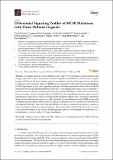Files in this item
Differential signaling profiles of MC4R mutations with three different ligands
Item metadata
| dc.contributor.author | Paisdzior, Sarah | |
| dc.contributor.author | Dimitriou, Ioanna Maria | |
| dc.contributor.author | Schöpe, Paul Curtis | |
| dc.contributor.author | Annibale, Paolo | |
| dc.contributor.author | Scheerer, Patrick | |
| dc.contributor.author | Krude, Heiko | |
| dc.contributor.author | Lohse, Martin J. | |
| dc.contributor.author | Biebermann, Heike | |
| dc.contributor.author | Kühnen, Peter | |
| dc.date.accessioned | 2022-01-17T15:30:07Z | |
| dc.date.available | 2022-01-17T15:30:07Z | |
| dc.date.issued | 2020-02-12 | |
| dc.identifier | 277434206 | |
| dc.identifier | f35c0013-76b8-413d-b62f-0aeef1c20cde | |
| dc.identifier | 85079514514 | |
| dc.identifier | 32059383 | |
| dc.identifier.citation | Paisdzior , S , Dimitriou , I M , Schöpe , P C , Annibale , P , Scheerer , P , Krude , H , Lohse , M J , Biebermann , H & Kühnen , P 2020 , ' Differential signaling profiles of MC4R mutations with three different ligands ' , International Journal of Molecular Sciences , vol. 21 , no. 4 , 1224 . https://doi.org/10.3390/ijms21041224 | en |
| dc.identifier.issn | 1661-6596 | |
| dc.identifier.other | ORCID: /0000-0003-3208-5347/work/106398013 | |
| dc.identifier.uri | https://hdl.handle.net/10023/24679 | |
| dc.description | Funding: This research was funded by SPARK BIH Validation Fund 2. P.S., P.K., H.B., P.A. and M.J.L. acknowledge funding by the Deutsche Forschungsgemeinschaft (DFG, German Research Foundation) through CRC 1423, project number 421152132, subprojects A1, A05, Z03 to P.S.; B02 to P.K. and H.B.; C03 to P.A. and M.J.L. | en |
| dc.description.abstract | The melanocortin 4 receptor (MC4R) is a key player in hypothalamic weight regulation and energy expenditure as part of the leptin–melanocortin pathway. Mutations in this G protein coupled receptor (GPCR) are the most common cause for monogenetic obesity, which appears to be mediated by changes in the anorectic action of MC4R via GS-dependent cyclic adenosinemonophosphate (cAMP) signaling as well as other signaling pathways. To study potential bias in the effects of MC4R mutations between the different signaling pathways, we investigated three major MC4R mutations: a GS loss-of-function (S127L) and a GS gain-of-function mutant (H158R), as well as the most common European single nucleotide polymorphism (V103I). We tested signaling of all four major G protein families plus extracellular regulated kinase (ERK) phosphorylation and β-arrestin2 recruitment, using the two endogenous agonists, α- and β-melanocyte stimulating hormone (MSH), along with a synthetic peptide agonist (NDP-α-MSH). The S127L mutation led to a full loss-of-function in all investigated pathways, whereas V103I and H158R were clearly biased towards the Gq/11 pathway when challenged with the endogenous ligands. These results show that MC4R mutations can cause vastly different changes in the various MC4R signaling pathways and highlight the importance of a comprehensive characterization of receptor mutations. | |
| dc.format.extent | 20 | |
| dc.format.extent | 3544565 | |
| dc.language.iso | eng | |
| dc.relation.ispartof | International Journal of Molecular Sciences | en |
| dc.subject | Biased signaling | en |
| dc.subject | G protein coupled receptor (GPCR) | en |
| dc.subject | Melanocortin 4 receptor (MC4R) | en |
| dc.subject | Melanocyte stimulating hormones MSH | en |
| dc.subject | RM Therapeutics. Pharmacology | en |
| dc.subject | Molecular Biology | en |
| dc.subject | Catalysis | en |
| dc.subject | Inorganic Chemistry | en |
| dc.subject | Organic Chemistry | en |
| dc.subject | Physical and Theoretical Chemistry | en |
| dc.subject | Spectroscopy | en |
| dc.subject | Computer Science Applications | en |
| dc.subject | NDAS | en |
| dc.subject | SDG 3 - Good Health and Well-being | en |
| dc.subject.lcc | RM | en |
| dc.title | Differential signaling profiles of MC4R mutations with three different ligands | en |
| dc.type | Journal article | en |
| dc.contributor.institution | University of St Andrews. School of Physics and Astronomy | en |
| dc.identifier.doi | https://doi.org/10.3390/ijms21041224 | |
| dc.description.status | Peer reviewed | en |
This item appears in the following Collection(s)
Items in the St Andrews Research Repository are protected by copyright, with all rights reserved, unless otherwise indicated.

